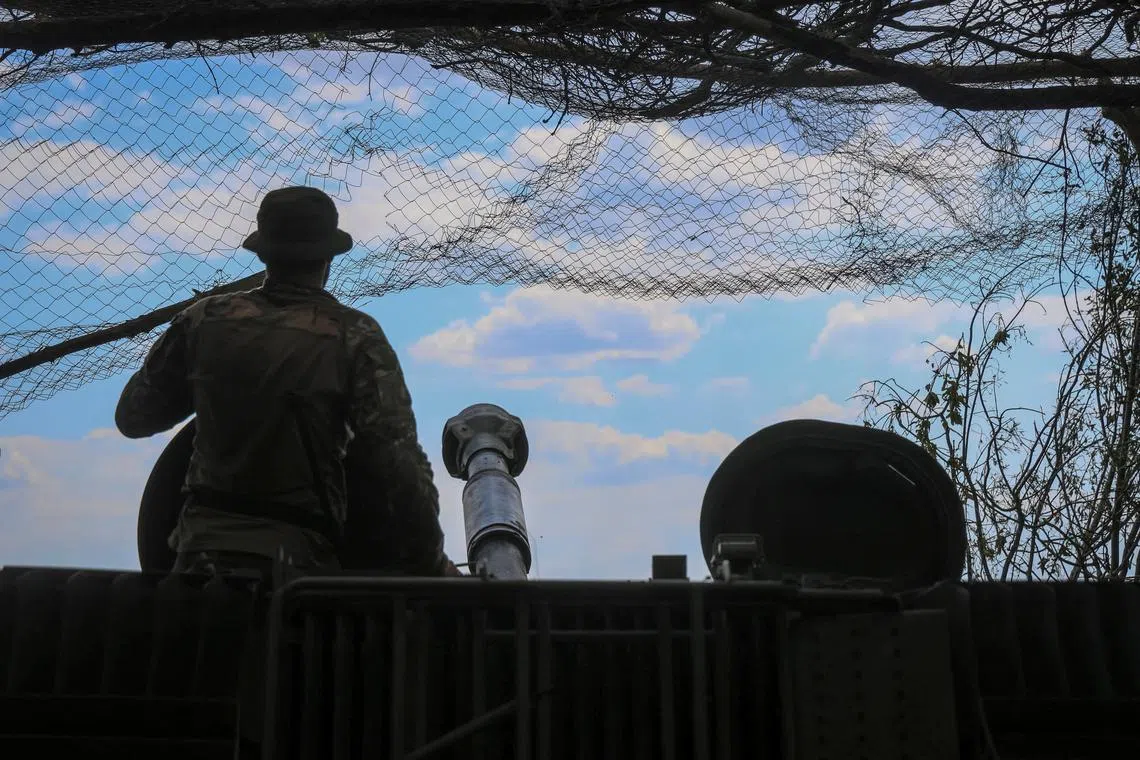G-7 ministers cite progress, but no done deal on tapping frozen Russian assets to aid Ukraine
Sign up now: Get ST's newsletters delivered to your inbox

A Ukrainian serviceman at a position in the Donetsk region preparing to fire a self-propelled howitzer towards Russian troops on May 21.
PHOTO: REUTERS
STRESA, Italy – Finance ministers from the Group of Seven (G-7) cited “progress” in finding ways to use profits from frozen Russian assets to help Ukraine as they wrapped up a meeting on May 25, envisioning a concrete proposal to present to a leaders’ summit in June.
A search for creative yet legally sound solutions was top of the agenda at the two-day G-7 meeting in Stresa, northern Italy, as Kyiv continues its urgent appeals for more funds from Western allies in its third year of war with Russia.
“We are making progress in our discussions on potential avenues to bring forward the extraordinary profits stemming from immobilised Russian sovereign assets to the benefit of Ukraine, consistent with international law and our respective legal systems,” the ministers said in a final statement.
They hope to present a proposal that is “defined in all its dimensions” to G-7 leaders ahead of a summit in Puglia, southern Italy, on June 13 to 15, Italian Finance Minister Giancarlo Giorgetti said during a news conference following the summit.
“Progress has been made,” Mr Giorgetti said, cautioning however that an agreed proposal “is clearly not yet finalised because it has significant technical and legal issues”.
“We do not deny the difficulties but there is a firm determination to arrive at a solution,” he added.
The G-7 finance ministers reiterated in their final statement that Russian assets frozen by the group “will remain immobilised until Russia pays for the damage it has caused to Ukraine”.
But they went further, saying they were “committed to further financial and economic sanctions... including continuing to target Russia’s energy revenue and future extractive capabilities”.
The G-7 is “ready to impose sanctions on individuals and entities that help Russia acquire advanced materials, technology and equipment for its military industrial base”, added the statement.
‘Right direction’
The summit wrapped up a day after the United States announced a new US$275 million (S$371 million) package of aid for Kyiv, part of a US$61 billion military aid deal passed by Congress in April after months of delays.
Kicking off the talks in Stresa, US Treasury Secretary Janet Yellen had urged her counterparts to embrace “ambitious options” in considering how to use the frozen Russian assets.
A debated US proposal would tap the interest generated by the €300 billion (S$441 billion) of Russian central bank assets frozen by the G-7 and European Union, creating a US$50 billion loan facility backed by future interest on the assets.
Mr Giorgetti – whose country Italy holds this year’s G-7 presidency – called the US proposal a “flexible and pragmatic” plan that answered the legal and regulatory concerns shared within the EU.
Last week, the EU agreed to a more modest plan, using interest from Russian assets frozen by the bloc potentially amounting to up to €3 billion a year.
Finance ministers attending the talks had warned that the Stresa summit was not likely to result in a concrete deal.
On May 24, France’s Finance Minister Bruno Le Maire described what they had reached as a “political agreement in principle, not a turnkey solution”.
Ukrainian Finance Minister Sergii Marchenko, who also attended the Stresa talks, said it was a “good signal that we are moving in the right direction”.
“I hope that during the G-7 leadership summit in June there will be some decision,” he told reporters.
‘Concerns’ over China trade
The G-7 ministers also called out China’s trade policies and industrial overcapacity, warning that the bloc could take measures to counter them.
The US has led warnings that a surge of low-cost Chinese exports fuelled by Chinese government support in key sectors like solar and electric vehicles pose a risk to global markets.
“While reaffirming our interest in a balanced and reciprocal collaboration, we express concerns about China’s comprehensive use of non-market policies and practices that undermines our workers, industries, and economic resilience,” said the statement.
The G-7 will “continue to monitor the potential negative impacts of overcapacity” and “consider taking steps to ensure a level playing field, in line with World Trade Organization principles”.
In February, the US argued that G-7 nations should seize the frozen assets outright, an idea it later backed away from due to the concern of allies that it could be a dangerous legal precedent and that Russia could retaliate. AFP


